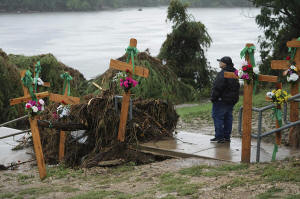FEMA chief rejects criticism, calls Texas floods response 'a model' for
dealing with disaster
[July 24, 2025]
By GABRIELA AOUN ANGUEIRA
The acting administrator of the Federal Emergency Management Agency is
pushing back on criticisms of the federal response to the central Texas
floods that killed at least 136 people earlier this month.
“I can't see anything we did wrong,” David Richardson told a House panel
of the Committee on Transportation and Infrastructure on Wednesday. He
called the relationship between state and federal agencies “a model for
how disasters should be handled.”
Lawmakers used the hearing about improvements to FEMA disaster response
to address reports that FEMA support was impaired by bureaucratic delays
that slowed the deployment of urban search and rescue teams and left the
agency's call centers unstaffed, which Richardson denied. The response
"brought the maximum amount of capability to bear in Texas at the right
time and the right place,” he said.
Richardson's appearance came after a wave of criticism and fallout over
the response, including the resignation Monday of FEMA's urban search
and rescue leader. President Donald Trump and Homeland Security
Secretary Kristi Noem have touted the robust federal support for Texas
despite their past support for eliminating FEMA.
Reports of delays on the ground denied
The acting administrator denied reports that FEMA urban
search-and-rescue teams were delayed over 72 hours because of a new rule
imposed by Noem that she must personally approve any contract of
$100,000 or more. Richardson said a Texas-based FEMA task force was on
the ground on July 4, along with other Homeland Security assets like the
Coast Guard and Customs and Border Protection, and that additional
support came within “24 hours” of being requested.

Rep. Greg Stanton, D-Ariz., pushed back on FEMA's readiness, asking why
more of the 28 FEMA urban search-and-rescue teams located around the
country were not on standby ahead of receiving a request from the state
of Texas. “It haunts me that we could have had more urban search and
rescue pre-positioned in place,” said Stanton. “That was a choice.”
The leader of FEMA's urban search-and-rescue effort, Ken Pagurek,
expressed frustration with the delays to colleagues before resigning
Monday, according to CNN. In response to Pagurek's resignation, a DHS
spokesperson told The Associated Press, “It is laughable that a career
public employee, who claims to serve the American people, would choose
to resign over our refusal to hastily approve a six-figure deployment
contract without basic financial oversight."
The Texas Division of Emergency Management did not respond to a request
for comment on whether search-and-rescue efforts were impacted by
delayed deployment of the FEMA teams.
Richardson also denied a report from The New York Times that 84% of
calls to FEMA went unanswered on July 7, three days after the July 4
floods, because Noem let lapse contract renewals with outside call
centers. The contracts were renewed July 10, according to The Times.
[to top of second column]
|

Rain falls as Irene Valdez visits a make-shift memorial for flood
victims along the Guadalupe River, Sunday, July 13, 2025, in
Kerrville, Texas. (AP Photo/Eric Gay, File)

“The vast majority of phone calls were answered. There was never a
lapse in the contract,” said Richardson, echoing Noem's statements
that the report was “fake news.”
Richardson defended his absence from the ground efforts in Texas,
saying he worked from Washington, D.C., “to kick down the doors of
bureaucracy” and denying suggestions that Trump or Noem told him to
stand down. He did not visit Texas until July 12.
FEMA's fate is still in question
Since the Texas floods, Trump has deflected questions about FEMA’s
fate. In June, he said he wanted to begin “phasing out” FEMA after
the hurricane season “to wean off of FEMA and bring it to the state
level.”
Trump has been criticized for delaying decisions on disaster
declaration requests, causing some states to wait as long as two
months for approval to receive assistance to repair public
infrastructure or help survivors.
Lawmakers pressed Richardson on more general issues of FEMA reform
as well, including concerns over long overdue preparedness grant
funding, flood insurance and rules about how much financial
assistance survivors can receive.
Both Democratic and Republican lawmakers asked about the fate of the
Building Resilient Infrastructure and Communities program, which
Trump canceled earlier this year. The grants supplied hundreds of
millions of dollars in disaster mitigation funding. Twenty states
are now suing the administration over the loss of funds.
On Tuesday, Trump approved disaster declaration requests for
Michigan, Oregon, Indiana, Kansas, West Virginia, Missouri and New
Mexico and expanded assistance in Kentucky.
Rep. Bob Onder, R-Mo., asked Richardson why it took a month for his
state to get a disaster declaration. “My constituents were
frustrated by how long it takes to get temporary housing and debris
removal assistance," Onder said. Richardson referred back to Texas'
declaration request: “We turned that around within just a couple
hours.”
A Trump-appointed FEMA review council is in the process of crafting
recommendations to the president on changes to the agency. Noem, who
co-chairs the council, told its members five days after the Texas
floods that FEMA “needs to be eliminated as it exists today and
remade as a responsive agency.”
Rep. Rick Larsen, D-Wash., said he and Rep. Sam Graves, R-Mo., would
introduce the bipartisan Fixing Emergency Management for Americans
Act this week, which would make FEMA an independent, Cabinet-level
agency, incentivize states to prioritize resilience and improve aid
for survivors. “We don’t need to wait for a FEMA review council,"
said Larsen. “We’ve been reviewing FEMA for a long time.”
All contents © copyright 2025 Associated Press. All rights reserved
 |